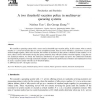Free Online Productivity Tools
i2Speak
i2Symbol
i2OCR
iTex2Img
iWeb2Print
iWeb2Shot
i2Type
iPdf2Split
iPdf2Merge
i2Bopomofo
i2Arabic
i2Style
i2Image
i2PDF
iLatex2Rtf
Sci2ools
EOR
2006
2006
A two threshold vacation policy in multiserver queueing systems
We consider a queueing system with c servers and a threshold type vacation policy. In this system, when a certain number d<c of servers become idle at a service completion instant, these d servers will take a synchronous vacation of random length together. After each vacation, the number of customers in the system is checked. If that number is N or more, these d servers will resume serving the queue; otherwise, they will take another vacation together. Using the matrix analytical method, we obtain the stationary distribution of queue length and prove the conditional stochastic decomposition properties. Through numerical examples, we discuss the performance evaluation and optimization issues in such a vacation system with this (d,N) threshold policy.
Related Content
| Added | 12 Dec 2010 |
| Updated | 12 Dec 2010 |
| Type | Journal |
| Year | 2006 |
| Where | EOR |
| Authors | Naishuo Tian, Zhe George Zhang |
Comments (0)

